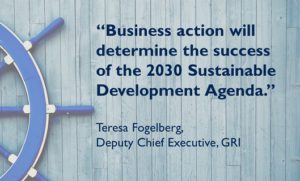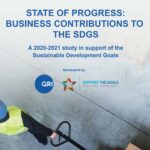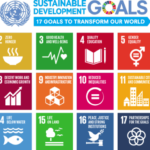
We are at a key moment in the evolution of sustainability; transparency is fast becoming the new paradigm for conducting business. The United Nations Sustainable Development Goals (SDGs) have ushered in a new era of global development objectives to tackle the world’s most pressing problems, and the active participation of business is a principle driver in achieving these goals. To date, best practices for corporate reporting on the UN Sustainable Development Goals have yet to be established. To address this issue, GRI and the UN Global Compact have initiated a ground-breaking initiative, ‘Reporting on the SDGs’. “We believe that business action will determine the success of the ambitious 2030 Sustainable Development Agenda, and the achievement of the SDGs. GRI and the UN Global Compact work with many thousands of businesses, and our partnership will enable them to incorporate SDG reporting into their existing processes, empowering them to act and make the achievement of the SDGs a reality.” says GRI’s Deputy Chief Executive Teresa Fogelberg.
GRI and the UN Global Compact are currently finalizing engagement with leading organizations to join an Action Platform, a multi-stakeholder movement that will play a pivotal role shaping the future of corporate reporting on the SDGs. The Platform aims to leverage the GRI Standards – the world’s most widely used sustainability reporting standards – and the Ten Principles of the UN Global Compact
Several organizations have already joined the two formations of the Action Platform.
The Corporate Action Group (CAG) comprising business representatives, will serve as a business engagement and peer learning forum, where members can show leadership in their SDG practices by helping define and promote their business contributions to the SDGs.
Throughout February, prominent corporations have been joining the Corporate Action Group. One of these is Danone, a global food company with a mission to achieve health through food. “Joining the Action Platform is a strategic choice for Danone, a commitment to solving pressing global issues, such as hunger. The goals are closely interlinked, and achieving them require contribution across sectors. In our view, the SDGs should be a top priority for business leaders worldwide” says Laura Palmeiro, Sustainability Integration Director at Danone.
Grupo Nutresa, Colombia’s leading processed food company, highlights the power of collaboration. “Being part of the Action Platform is a great opportunity to share knowledge, experiences and best practices. It has also been very useful to understand how we can incorporate SDGs into the decision-making process, strategies, corporate goals and metrics,” states Sol Beatriz Arango, President of Services and Vice President of Sustainable Development at Grupo Nutresa.
Other corporate members include Coca-Cola, Cemex, Telecom Italia, Nestle and Fuji Xerox, to name a few.
The Multi-stakeholder Advisory Committee (MAC) comprises the CAG plus representatives from governments, international and civil society organizations, investors, trade unions, data users, statistical offices and academics, and will feed into the vital research done by the UN Global Compact and GRI. The MAC will act as a forward-looking international leadership group that guides companies to embrace the SDGs and demonstrate their contribution through reporting. The MAC will play a key role in delivering a global list of prioritized disclosures for tracking business contributions to the SDGs, to be presented during the UN High-level Political Forum on Sustainable Development in July 2017.
Several members have also joined the Multi-stakeholder Advisory Committee recently, including the World Bank, Principles for Responsible Investment (PRI), Oxfam, RobecoSAM, UN Development Programme (UNDP), and the Dutch and Colombian governments.
Kicking off the Action Platform
The Action Platform will be launched in The Hague on 27th of March with an in-person event hosted by the Ministry of Foreign Affairs of the Netherlands. Using a multi-stakeholder approach, the Action Platform will compile relevant disclosures and guidance for businesses to report on their contribution to the SDGs. “Our ambition is to create a coherent, smart, and approachable framework for how businesses can think about and report on the SDGs,” says Carrie Hall, Chief, Impact Reporting at UN Global Compact. The list of business disclosures for reporting on the SDGs will be released at the UN High-level Political Forum in July. Further guidance and best practices will follow in September.
The second year of the program will be focused on action. “In this phase, the emphasis will be on mobilizing businesses to show commitment towards the Agenda 2030: to demonstrate tangible steps in making an impact towards achieving the SDGs”, affirms Fogelberg.
Important dates
27 March: Launch of CAG and MAC in The Hague, the Netherlands. Event will be hosted by the Ministry of the Foreign Affairs of the Netherlands.
18 July: Releasing the list of priority business disclosures at the High-level Political Forum in New York. Business Day hosted by the UN Global Compact.
18 September: Publishing guidance and best practices for reporting on the SDGs at the UN General Assembly in New York.
Corporate Action Group program 2017–2018
.png)
With a few spots still available, GRI and the UN Global Compact invite practitioners from corporations to join the Corporate Action Group and become part of the Reporting on the SDGs Action Platform. Learn more about the CAG here and submit your application.



